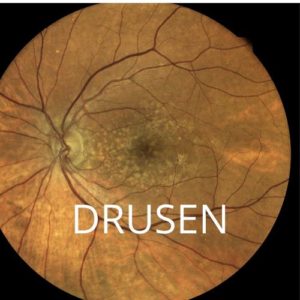Drusen and Macular Degeneration


Druse (singular) are composed of a fatty material called lipid. They reside within the layers of the retina. They can be found anywhere in the retina, but are of most concern when they are found within the macula.
The macula is the functional center of the retina giving us most of our functional vision. It is the macula which provides our central vision, ability to read fine print and see colors.
Types of Drusen
There are two types: soft and hard. The differences are based upon their physical appearance.
Soft drusen are usually large, more numerous and present in clusters compared to the "hard" type. Hard drusen are fewer and smaller. Soft drusen are usually associated with an increased risk of developing macular degeneration, whereas the "hard" variety is not necessarily indicative of having macular degeneration.
Hard drusen are more common, more likely to be unassociated with disease and appear more frequently as we age.
Any drusen, especially when involving the macula, can be concerning.
Drusen and Macular Degeneration
To many eye doctors, there is no distinction between hard and soft drusen. Often, it may be difficult to draw a distinction between the two types of drusen.
Because of the association with macular degeneration, many eye doctors will give the same advice of periodic examination, monitoring with an Amsler grid and warning signs of decreased vision and distortion - the hallmark symptoms of macular degeneration.
Diagnosis of Macular Degeneration
The diagnosis of macular degeneration is based on the following:
- Age over 55
- Decreased vision in one or both eyes
- More common in patients of northern European descent
- Symptoms of blurriness and/or distortion
- Pigmentary changes in the macula
- Leakage of fluid and/or blood
- Presence of drusen
In addition to periodic examination and self-monitoring, your eye doctor may recommend a consultation with a retina specialist to confirm the diagnosis.
A retina specialist may consider additional testing, such as:
- Fluorescein angiogram
- OCT - optical coherence tomography
- Digital photos
In short, drusen can be normal and the mere presence of them alone does not create the diagnosis of macular degeneration. Consult your eye doctor or retina specialist if you have concerns or questions or you have symptoms of blurry vision and/or distortion.


